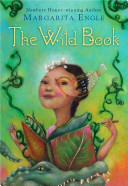
The Wild Book
Written By Margarita Engle
Houghton Mifflin Harcourt, 2012, 121pp.
ISBN: 978-0547581316
The story opens in the year of 1912 on a farm in Cuba with little Fefa and her Mamá leaving the doctor’s office where the doctor has just declared that Fefa has “word blindness” and that she will never be able to read or write. Fefa is stunned and confused, while Mamá is determined not to let this diagnosis affect her daughter’s determination to learn to read and write. She begins immediately with encouraging words of patience. Mamá gives Fefa a book, which alerts Fefa’s fear of words moving around and slipping off the pages. But as Mamá gives her the book she tells Fefa to imagine the blank pages as a garden, and to spread wildflower seeds all over the pages and watch her words sprout and grow. Fefa is thrilled to learn the book is truly filled with blank pages and she wonders when or even if she will be able to fill it with words. Inspired by her mother’s positive outlook, Fefa continually and patiently practices her writing in this wild diary throughout the novel.
As the novel continues daily family life, associations with siblings, a yearly family outing, and cultural traditions typical for Cuban girls and boys are described. Within each of the family insights there is an underlying fear of the dangers of kidnappers and family tragedies. Margarita Engle’s word choice and elegant flow of language allows the reader to be aware of the dangers without turning this into a novel of terror, which mirrors the harmony of the paternal love in this story for the children. Engle has included in this personal family memoir brief glimpses of the times in Cuba’s history she has accomplished so well in her award winning novels The Poet Slave of Cuba: A Biography of Juan Francisco Manzano (2006) and The Surrender Tree: Poems for Cuba’s Struggle for Freedom (2008).
Fefa’s struggles with her school work continues as does her fear of reading OUT LOUD as the words slip and slide all over the pages. Yet, she continues to practice her handwriting which becomes beautiful, and she slowly begins to recognize written words. These skills ultimately help her entire family, as the reader will see in the end. Engle shares in the Author’s Notes that her grandmother learned to read and write beautifully and wrote many letters to her family members during her lifetime.
The glimmer of hope that shines through troubled times in all of Margarita Engle’s work beams once again in this charming memoir of her grandmother, filled with determination to press on no matter what the difficulty, knowing there is no obstacle that cannot be overcome. Engle’s passion for both Cuba and her family is revealed throughout these pages of the struggles and ultimate triumph of her grandmother’s struggle with dyslexia as a young girl growing up in Cuba.
Engle writes this personal novel in the same style of poetic prose found in her award winning historic novels, also based in Cuba. The story of Fefa, Margarita’s grandmother, is told in first person by her grandmother as a young girl growing up in a large family in Cuba at the beginning of the twentieth century. In the “Author Note” Engle shares that this book is fiction and is a re-telling of oral stories told to her by her maternal grandmother. While this book is not a historical fiction based on a nation’s history as Engle’s other novels, it does look at life in the Cuban countryside in 1912, thus revealing once again Engle’s passion for the past and her heritage in Cuba. She writes for and dedicates this book to an audience of “young readers who dread reading and for those who love blank pages.”
In personal communication with Margarita Engle, she explained to me that on a trip to Cuba with her grown children she shared these stories as she showed them various places where events had happened in their great-grandmother’s life. Engle’s daughter, in whose eyes I could see love and admiration for her mother and her work, asked her mother to write these stories down. This was all the inspiration Engle needed to write this most personal memoir. Within the pages of The Wild Book Engle writes based on her own family history as opposed to the history of a nation as revealed in previous books.
Within the pages of this latest multicultural book, Engle has added focus to another group with her spotlight on “word blindness” as it was called in the early twentieth century; the term today is dyslexia. She has researched and sought professional expertise in this area, and she takes responsibility for any misinterpretations in the acknowledgements section of this book. As in her other books, Engle has done a splendid job of recognizing the possibilities of persistence, determination, and hope. In light of these themes within books of disabilities, The Wild Book could be paired with The Alphabet War: A Story about Dyslexia (Diane Burton Robb, 2004), Out of My Mind (Sharon Draper, 2010), and Mockingbird (Kathryn Erskine, 2011).
Ragina Shearer, Calhoun Middle School, Denton, TX
WOW Review, Volume IV, Issue 3 by Worlds of Words is licensed under a Creative Commons Attribution-NonCommercial-ShareAlike 4.0 International License. Based on work at https://wowlit.org/on-line-publications/review/iv-3/

Deborah,
I appreciate that you bring your knowledge and experiences in Haiti to bear as you commented on the language Nick Lake uses and the accuracy of the historical figures he references.
I started the book after hearing Lake speak at ALA Midwinter in January – but the story was just too dark for me at the time. Perhaps, after reading your review, I will pick it up again.
Thank you for your insights.